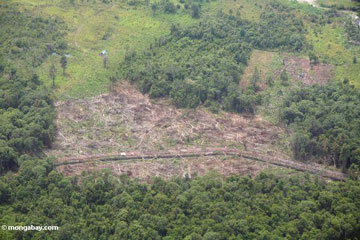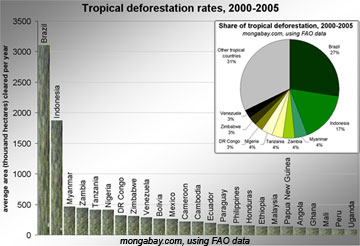Australia funds first global deforestation monitoring system
Australia funds first global deforestation monitoring system
mongabay.com
July 23, 2007
At a High Level Meeting on Forests and Climate being held in Sydney, Australia today announced a series of measures to slow deforestation and fight global warming.
Australia said it will commit AU$10 million ($US8.8) to support efforts to reduce greenhouse gas emissions from deforestation and promote sustainable forest management in Indonesia, a country that presently loses about 1.6 billion trees per year to logging, fires, and agricultural development, and is the third largest producer of greenhouse gases due to deforestation.
The Australian government also said it would push the development of a new global system to monitor changes in forest cover and forest carbon levels as well as contribute AU$11.7 million ($US10 million) to the World Bank’s new Global Forest Alliance, a program that seeks to bolster compensation for tropical countries that help slow carbon emissions by reducing deforestation rates. The measures are part of Australia’s AU$200 million Global Initiative on Forests and Climate.
“Australia is inviting partner countries to work with us to link national, regional, and international systems to create a truly global system to monitor forest cover and carbon levels,” said Australian Minister for the Environment and Water Resources, Malcolm Turnbull. “This new Global Carbon Monitoring System will be supported by remote sensing satellite monitoring technology and on-the-ground carbon accounting activities. By providing better access to historical data and providing timely access to new data, it will support countries’ efforts to reduce emissions from deforestation.”
The development of a monitoring system for deforestation would allow policymakers to establish baseline deforestation rates which could then be used to compensate tropical countries that reduce their rates of forest loss. Avoided deforestation, as the measure is termed, is believed to be one of the most cost-effective ways to cut emissions. By some estimates, the concept could eventually send tens of billions of dollars per year to some of the world’s poorest countries while slowing climate change and protecting biodiversity and important ecosystem services. CIFOR, a forestry research organization, notes that Indonesia, given its high emissions from conversion of its carbon-rich peat swamps, would be a critical participant in the early stages of such program. The Australian government agrees:
 Clearing for oil palm in Indonesia |
“Indonesia is a key partner in the Global Initiative on Forests and Climate,” said Minister for Foreign Affairs, Alexander Downer. “This package will help Indonesia develop pilot projects to demonstrate the effectiveness of reducing deforestation; improve local forestry governance; and prevent, monitor and suppress peatland fires, including by training Indonesia’s fire fighters and fire management. It will also support Indonesia’s move to develop a forest monitoring and assessment system to generate better forest sector data.”
Worldwide, deforestation and other forms of land use change release about 1.7 billion tons of carbon per year, representing 20-25 percent of global emissions.
